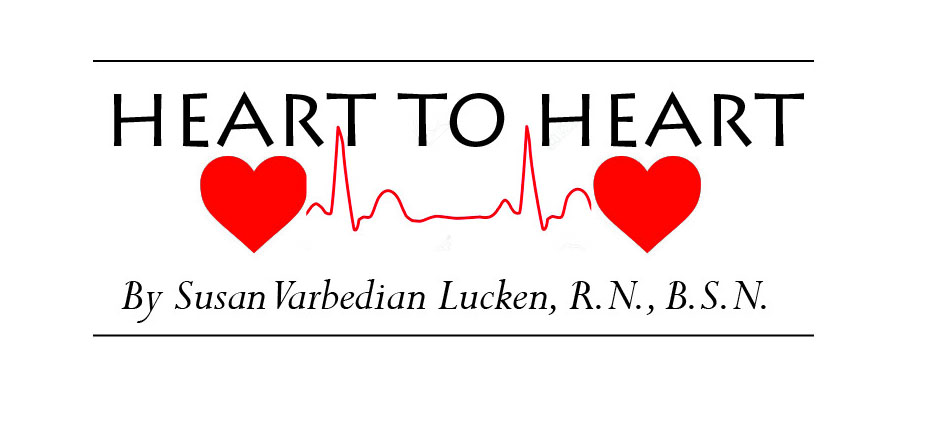Be wary of Heart Valve Disease this February
By Susan Varbedian Lucken, R.N., B.S.N.
February is American Heart month, so it is only appropriate that we discuss the topic of heart valve disease. In heart valve disease, one or more of the valves in your heart doesn’t work properly. Your heart has four valves that keep blood flowing in the correct direction. The four valves are called the mitral valve, tricuspid valve, pulmonary valve and aortic valve. In some cases, one or more of the valves don’t open or close properly. This can cause a disruption in the blood flow through your heart to your body. Heart valve disease may be present at birth ( congenital ). It can also occur in adults due to many causes and conditions, such as infections and other heart conditions.
SYMPTOMS
Some people with heart valve disease might not experience symptoms for many years. Signs and symptoms may include:
- Abnormal sound ( heart murmur ) when a doctor is listening to your heart with a stethoscope
- Fatigue
- Shortness of breath, particularly when you have been very active or when you lie down
- Swelling of your ankles and feet
- Dizziness
- Fainting
- Irregular heartbeat
Heart valve problems may include:
- Regurgitation. This is where the valve flaps don’t close properly, causing blood to leak backward in your heart. This commonly occurs due to valve flaps bulging back, a condition called prolapse.
- Stenosis. This is where the valve flaps become thick or stiff, and they may fuse together. This results in a narrowed valve opening and reduced blood flow through the valve.
- Atresia. In this condition, the valve isn’t formed and a solid sheet of tissue blocks the blood flow between the heart chambers.
RISK FACTORS FOR HEART VALVE DISEASE
- Older age
- History of certain infections that can affect the heart
- History of certain forms of heart disease or heart attack
- High blood pressure, high cholesterol, diabetes and other heart disease risk factors
- Heart conditions present at birth ( congenital heart disease )
COMPLICATIONS
- Heart failure
- Stroke
- Blood clots
- Heart rhythm abnormalities
- Death
DIAGNOSIS
Your doctor will conduct a physical exam and will listen for a heart murmur as this can be a sign of a heart valve condition. He/She may order several tests to diagnose your condition. These may include:
- Echocardiography
- Electrocardiogram ( ECG )
- Chest X-ray
- Cardiac MRI
- Exercise tests or stress tests
- Cardiac catheterization- this test isn’t often used to diagnose heart valve disease, but it may be used if other tests aren’t able to diagnose the condition or to determine its severity
TREATMENT
Heart valve disease treatment depends on how severe your condition is, if you’re symptomatic and if your condition is getting worse. You will be treated by a cardiologist and possibly a multidisciplinary team of doctors and medical staff trained in evaluating and treating heart valve disease.
- Monitoring your condition with regular follow-up appointments
- Recommending healthy lifestyle changes
- Medications to treat symptoms
- Heart valve surgery if indicated i.e. valve repair or valve replacement
LIFESTYLE CHANGES YOUR DOCTOR MAY SUGGEST:
- Eat a heart-healthy diet i.e. fruits, vegetables, low-fat or fat-free dairy products, poultry, fish and whole grains. Avoid excess salt and sugar.
- Maintain a healthy weight
- Getting regular physical activity
- Managing stress
- Avoiding tobacco
Now that you know the signs and symptoms of heart valve disease, talk to your doctor about any symptoms that you are concerned with and make sure that you schedule routine checkups with your doctor. This will make it more likely that your doctor will discover any potentially serious conditions in the early stages.
Sources: mayoclinic.org
